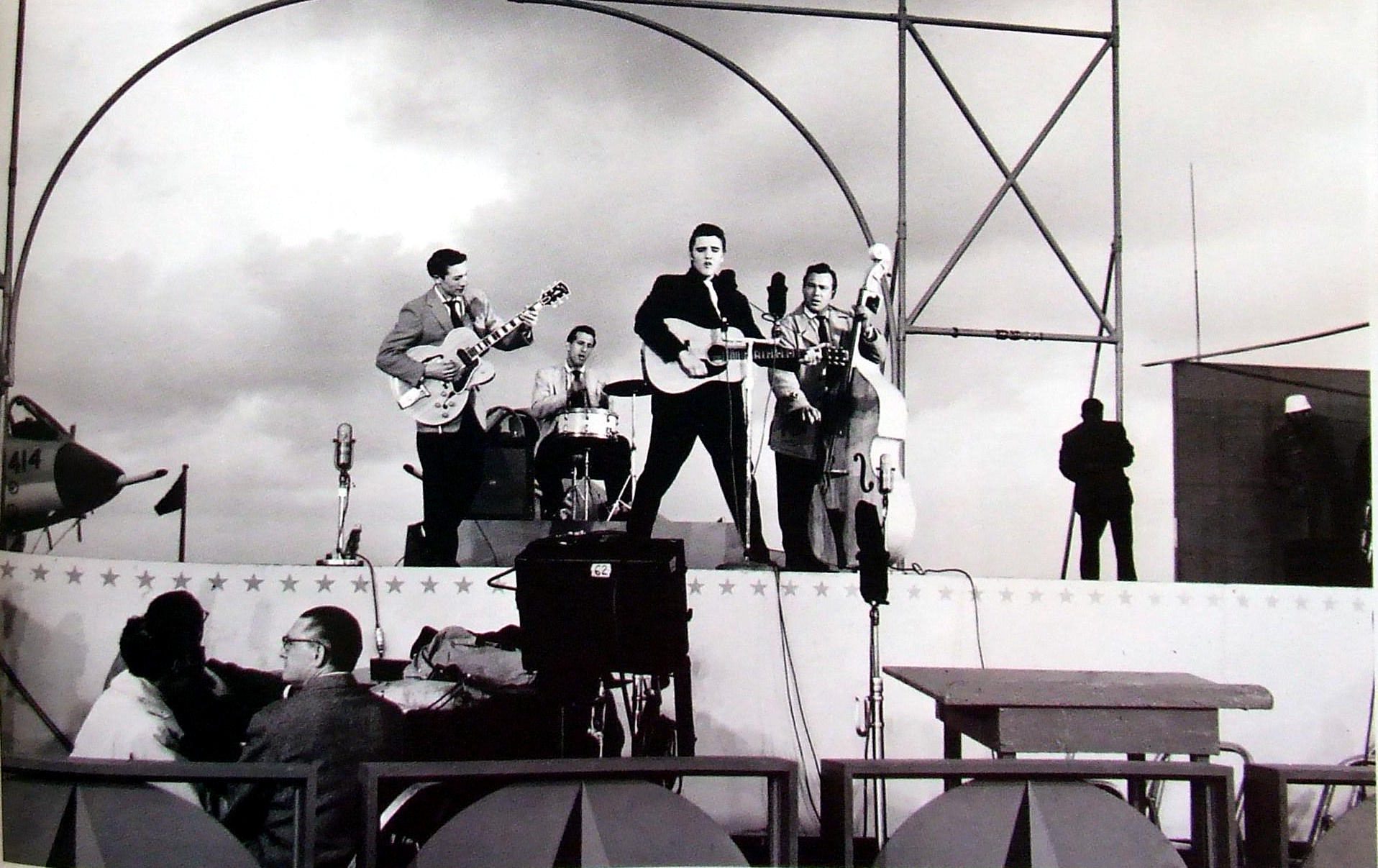
On the third day of April in 1956, a spectacle unfolded that was nothing short of a cultural earthquake, with Elvis Presley at its epicenter. This wasn’t your garden-variety television appearance; it was an event that would ricochet through the annals of music and television history, leaving an indelible mark on the fabric of American culture.
The setting was as unconventional as it was grandiose—the USS Hancock, a majestic aircraft carrier, stationed in San Diego, California, transformed for one day into the world’s most unique concert stage. The choice of venue was a masterstroke, blurring the lines between the military’s disciplined rigor and rock ‘n’ roll’s rebellious fervor, a juxtaposition that mirrored the complex tapestry of 1950s America.
Elvis, clad in his now-iconic stage attire that melded the flamboyance of a showman with the rugged charm of a country boy, was at the peak of his powers. With the Pacific Ocean as his backdrop and surrounded by a sea of sailors, the King launched into renditions of ‘Heartbreak Hotel’, ‘Shake, Rattle and Roll’, and ‘Blue Suede Shoes’ with a vigor that was palpable even through the black-and-white television screens of the era.

But it wasn’t just the visual spectacle or the novelty of the venue that captured the nation’s imagination; it was the way Elvis moved. His performance on the Berle show was one of the first times a national audience witnessed his provocative hip gyrations and unabashed energy, a stark departure from the crooners and balladeers who dominated the airwaves. This was rock ‘n’ roll in its purest form, and America was both scandalized and mesmerized.
The impact of this performance reverberated far beyond the confines of the USS Hancock. An estimated 25% of the American population tuned in, captivated by the raw, unfiltered essence of a musical revolution unfolding before their eyes. It was a unifying moment, where families—regardless of age or social strata—gathered around their television sets, drawn by the allure of something wholly new and exciting.
Elvis’s performance on ‘The Milton Berle Show’ also showcased the burgeoning power of television as a medium. It demonstrated how TV could create shared national experiences, shaping public consciousness and influencing popular culture in a way that had never been seen before. This appearance solidified Elvis’s status as a cultural icon, transcending the boundaries of music to become a symbol of a youthful rebellion that was beginning to simmer beneath the placid surface of 1950s America.

Behind the scenes, the story was just as compelling. The logistics of staging a live television show from the deck of an aircraft carrier were monumental. Technical crews worked tirelessly to ensure that the broadcast would go off without a hitch, contending with the unpredictable elements and the inherent challenges of such a unique venue. The sailors aboard the USS Hancock, many of whom were probably unaware of the historic nature of the event they were a part of, found themselves not just as backdrop extras but as witnesses to a pivotal moment in cultural history.
In the aftermath, the reaction was polarized—Elvis’s overtly sexual performance style drew ire from the conservative quarters, who decried the corrupting influence of rock ‘n’ roll. Yet, for the youth, Elvis’s unabashed expression and magnetic charisma became emblematic of a new era of freedom and defiance.
The Elvis spectacle aboard the USS Hancock wasn’t just a concert; it was a clarion call that announced the arrival of rock ‘n’ roll as a dominant cultural force. It was a testament to the power of music to transcend boundaries, to challenge norms, and to unite people across divides. And as the waves lapped against the hull of the USS Hancock long after the show had ended, they seemed to carry with them the reverberations of a society on the cusp of change, with Elvis Presley steering the helm towards uncharted waters.



Leave a Reply